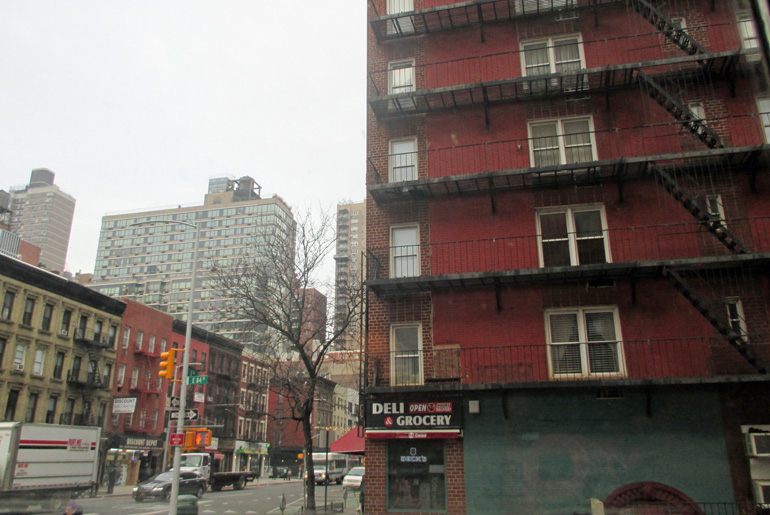Gotham Diary:
How to say “TPFDL”
January 2018 (V)
Tuesday, January 30th, 2018
30 and 31 January; 1 February
Tuesday 30th
Juleanna Glover asks, in today’s Times, “Are Republicans Ready to Join a Third Party?” The question is interestingly phrased: join, not form. Would Republicans, in short, be willing to combine with people who aren’t Republicans? Glover proposes, just as an example, a Biden-Sasse ticket for 2020.
My question, of course, is whether this new party would have a hope of being a genuinely liberal party, and I ask it without being quite sure that liberalism remains viable, or even desirable. I’m inclined to believe that it is, but I can’t overlook the brittleness with which any given generation of liberals responds to altered circumstances. Liberals are gradualists, devoted to protecting rights and interests from state intervention, and, ultimately, from the encroachments of other interests. This has often led liberals to back the wrong horse. Liberal belief in the rights of free men was an important ideological prop to slaveholders, and George Dangerfield’s wonderful study, The Strange Death of Liberal England 1910-1914 illustrates the slow-motion collapse of a great and powerful political party, undermined by the demands of rising new constituencies: labor, women, and the Irish.
Even more doubtful than the viability of liberalism as a political outlook is the viability of “liberalism” as an intelligible word. Glover writes,
There are many Republicans wary of a second term for Mr. Trump, and yet right now they are entirely reliant on the Democrats to deliver a winning centrist candidate out of a primary process that almost made Bernie Sanders their 2016 nominee. A contest between Mr. Trump and a liberal Democratic candidate like Senator Elizabeth Warren of Massachusetts would leave the middle up for grabs. And a big contingent of politically orphaned political strategists, academics and donors would be ready to lend support.
Elizabeth Warren may be a Democrat, but she is no liberal — because she is not a gradualist. A great deal of confusion in our political discourse would be cleared up if we all agreed that, beyond policy differences, there is the key issue of timing, which I call the “tipfiddle.”
This curious word, tipfiddle, derives from the acronym for an elaborate logistics schedule devised by the Pentagon, the Time-Phased Forces Deployment List, for the unrolling of new military campaigns. Donald Rumsfeld’s claim to infamy, I expect, will be based largely on his disregard for this schedule in embarking on the misadventure in Iraq (still something of a mess). It occurred to me not long ago that the complete lack of a tipfiddle does much to explain the disappointing aftermath of the 1960s campaign for equal civil rights. A couple of blockbuster Acts of Congress were expected to do everything, and the resulting failure of a top-down program to win the hearts and minds of white Americans, especially couple as it was with a similar failure in Vietnam, brought into the being the image of a liberal élite bogeyman that has rendered our government fairly ineffectual ever since.
Many white Southerners who hated segregation argued that the South wasn’t ready yet, in the Sixties, for equality. Liberals have a weakness for this kind of argument. Their largely healthy mistrust of abrupt change too often allows injustice to persist. Advocates of social justice can rightly claim that liberals will never get around to making necessary changes. The only liberal response lies in the preparation of tipfiddles. Looking back at civil rights, for example, we can see that there ought to have been (among many other things) some thoroughgoing consciousness-raising in the North, which, in the absence thereof was able to give itself a pass on its own deep-rooted racism. (Where was objection to busing more virulent than in Boston?)
Tipfiddles are couched in terms of actions that are staged in order to increase the effectiveness of each action. Goals are not the point, because they’re too obvious. So it is with political problems. We know what the goals are, but nothing is going to come of, say, specifying emissions caps by Year N if we don’t have a detailed and acceptable plan for achieving them. Such plans are what genuine statesmen, acting in a representative democracy, are supposed to sell to voters. It’s not easy, and it’s not glamorous, and it probably works best at the local level.
Of course, the great tipfiddle-failure story of our time is playing out with Brexit. (What’s this about Boris Johnson, of all people, wanting to build a bridge?)
***
Wednesday 31st
Since the weekend, I’ve been in a slight daze, involuntarily meditating on something that happened a long time ago, at the end of 1980. It didn’t happen to me, and I didn’t know about it until this weekend, when I read about it in a book. Here is what I read:
She did it partly to punish me for stopping wanting to fuck her and partly because she realized that I didn’t like her much. Well, I liked her as much as you could like anyone totally wrapped up in themselves and unable to tolerate the slightest competition or anything a raving lunatic could see as opposition and having to have their own way in everything all the time. Well, I expect reading between the lines there you can see that we hadn’t been getting on too well of late. Yeah, but not having her around and trying to take in the fact that she will never be around is immeasurably more crappy than having her around. I’ve had a wife for 32 years.
As I continued reading the book, and learned that the writer of the letter refused, once he understood that his wife really wasn’t ever coming back, to say anything at all nice about her. Which perhaps wouldn’t be surprising in an ordinary bloke. But Kinsley Amis, author of many novels and much nonfiction, much of it humane and humorous? When he was at home, it seems, he expected his wife to put up with his dislike, which visitors to the house toward the end of the marriage claim was palpable. He gritted his teeth. But no matter how remote he became, it seemed right to him that his wife should simply bear with the lack of affection. I’ve had a wife — interesting, that. To put it correctly, Amis had had two wives over that thirty-two year period.
And the first wife, the former Hilary Bardwell, came back to take care of him. She brought her second husband, an impecunious earl, with her, and the three of them lived happily ever after. Meanwhile, Elizabeth Jane Howard, by then the author of several novels and a figure in London’s literary life, lived alone for the rest of her life (excepting a brief fling with a con man quite late in life). Jane did not care to be alone any more than Kingsley did, but she couldn’t take life with a man whose feelings for her were rapidly approaching physical revulsion.
What makes the passage that I’ve quoted, which comes from a letter to the poet Philip Larkin and is quoted in Artemis Cooper’s new biography, Elizabeth Jane Howard: A Dangerous Innocence, so heavy for me is Amis’s perversity. Would you like to live with someone who made you grit your teeth every time she said something? Wouldn’t you be happier if she left? Wouldn’t you think of leaving? But no. Nothing personal, but you’re the wife here, lady, and you’ll stick with it. That seems to sum up his thinking. And of course it was traditional, since time out of mind, for husbands to think like that. I wonder if it occurred to Amis that he was betraying his roots. He had come from such a very traditional background, but had made it to university and achieved literary acclaim. That it might be a mistake for him to leave the future Countess of Kilmarnock for Jane Howard is suggested by Jane’s having cautioned him, during their early, lovey-dovey days, that she was not as posh as he thought she was. (Cooper writes that they came from the opposite ends of the middle class.) In their fifteen years together, he seems to have tired of her poshness, and she was at any rate posh enough to demand a reasonably affectionate husband.
Mind you, I’m not taking sides here. I’m just feeling a strange mix of pity, contempt, and disgust for Kingsley Amis, occasioned by this display of wounds of which he is not at all ashamed. It’s embarrassing to see an eminent novelist taking such a nakedly utilitarian view of marriage. Which apparently he had been doing for quite a while before Howard left him.
***
Cooper’s biography of Howard arrived while I was in the middle of re-reading her biography of Elizabeth David, to which I promptly returned and which I finished last night. A couple of interesting compare-and-contrast points stick out.
Contrast: As when I read about David the first time, I haven’t read anything written by Howard herself. I’ve ordered the five-volume series, a sort of family autobiography, about the Cazalet family, and look forward to reading it. But in the nearly twenty years since Writing at the Kitchen Table came out, I’ve acquired and read a lot of David, and I think she’s one of the great writers of modern times. She can inflect ostensibly expository prose with a wide range of dramatic attitudes without dimming her intelligibility in the slightest. And I don’t know anyone who is better at expressing speechless outrage, as she does in her introduction to the 1988 edition of her first work, A Book of Mediterranean Food.
From the hands of a publisher called Robert Hale, of whom I shall say no more than it seemed a singular misfortune to have had my books acquired by his firm, I was rescued…
The point of contrast is that David meant a great deal more to me the second time around, and in fact I kept putting down her biography to read her. I was not nearly as engaged by Howard herself, although I couldn’t put her story down. She was a character, not a creator. That will presumably change.
Comparison: In the other David biography that I’m still re-reading, by Lisa Chaney, there’s a wonderful little flash of revelation about Laurence Durell that intensified my doubts about the importance of formal education, while at the same time giving an ironic cast to the achievements of David and Howard, despite their complete lack of higher education. Of Durell, who came from a good family but whose upbringing was highly unorthodox, we’re told that some of his friends in Cairo, during the war, thought that his “lack of a classical education made him not quite ‘pukka.’ (181) With regard to Durrell himself, this is already pretty rich, since he spent his adolescence on the island of Corfu, in Greece, instead of on the island of England, belaboring ancient Greek verses. Missing out on such academic exercises doesn’t seem to have done David or Howard any harm, either. David, indeed, became a genuine scholar, teaching herself how to set up a library in the process. One has to ask what, exactly, was so indispensable about the public school/university pedigree. Beyond, of course, the boys’ club shibboleth. Nancy Mitford used to wail about not having been properly taught anything, but I suspect she was imagining that there was more to schooling than there was. In all cases — Durrell, David, Howard, and Mitford — the joy of reading appears to have sufficed.
***
Thursday 1st
There’s an interesting piece in today’s Times in which A O Scott calls on each of us to reassess our impressions of Woody Allen’s movies. He doesn’t ask for a boycott, just a recognition that some of the behavior is not so charming or innocent as we might have thought, shrugging it off, at the time. I’ve always been aware of this problematic aspect of Allen’s work; to me, it heightens the interest. (Does anyone remember when “transgressive” was a good thing?) I think of Allen primarily as a magician — his most recent films bring this to the fore — and not as a moralist, which is, to be sure, what he pretends to be. Sometimes it seems to me that he doesn’t know what he’s doing. He does what he thinks he’s doing extremely well, but he’s also doing something else, almost inadvertently, and this tension is what makes his movies so appealing — so much more than merely funny. I wish I knew what this something else was. There’s a hint, perhaps, in Hollywood Ending: Woody Allen’s character keeps breaking down in conversations with his ex-wife. He cannot sustain the businesslike tone with which they begin. Without warning, he breaks into wrathful denunciations of her unfaithfulness and her poor taste in men. I sense that something like this is happening beneath the surface of each one of Allen’s films.
Consider Oedipus Wrecks, perhaps his greatest film even if nobody knows it (because it comes at the end of New York Stories, following two really awful essays in self-indulgence by Martin Scorsese and Francis Ford Coppola). In Allen’s exquisite little joke, a suffocating mother disappears in the middle of a magic act — she really does disappear! — and Allen, playing the son, is thrilled. He can’t stop smiling with relief! But then she appears in the sky over New York City, telling everyone about his unattractive habits as a child. He is driven to attempt suicide. “That’s no solution,” says his shiksa fiancée (played by Mia Farrow in one of their final collaborations). Indeed! His mother’s antics break up that relationship and steer him toward Ms Right, a bogus sorceress whom he enlists to put an end to them (Julie Kavner). If you lay it all out on the table, it’s a fairly ugly psychoanalytical problem. The guy really does want his mother dead. And yet we laugh! Of course, the mother doesn’t die; she comes back to earth when Allen hooks up with Kavner. (“Now her I like.”) Happy, healthy ending. The “moral” of the story? It’s pointless to be a self-hating Jew.
Owing to an enormous change in mores, a lot of wishes that men have entertained for good times with girls have recently become as unacceptable for acting out as the Oedipus complex. I remember seeing Manhattan for the first time with my future wife. When it was revealed that the Mariel Hemingway character was a student at the Dalton School, Kathleen (a Brearley girl) blurted out, quite audibly, “Figures!” That was how we registered the inappropriateness of the girl’s relationship with an older man — indirectly. The school and the girl’s parents ought to have stepped in, but they were either too progressive or too sophisticated to interfere. The fantasy being gratified by Woody Allen’s character was not itself held up to shame. Who wouldn’t want to have a beautiful teenage girlfriend? Well, as a matter of fact, I wouldn’t, but you check matters of fact at the door when you take in a magic act.
Fossil Darling has just called with news of the latest pin to be knocked down: 84 year-old John Copley, directing a revival of Semiramide at the Met, apparently made a joke that was misunderstood by a singer whose first language was not English. Fossil, who knows Copley, told me that he was already on a plane back to Blighty. What’s going on, I think, is a genuine consciousness-raising, the thing that was supposed to happen way back in the early Seventies but couldn’t, because the Terror-like uncertainty and violence (what other word describes such sudden terminations of careers?) would never have been tolerated. What it took to get where we are was a generation of women who grew up entirely within what was supposed to be a new dispensation, what Jill Lepore calls “empowerment feminism,” which, in her view, has been a failure, because it facilitates the villainies of the Harvey Weinsteins. This generation of women was not raised to guard its own integrity, as women everywhere have always been. That’s why older people are cocking eyebrows and humming “Victims!” The young women are victims, though — victims of a social failure to prescribe appropriate conduct between the sexes, or between the powerful and the powerless. It makes the old consciousness-raising look more like obliviousness.
And if I get started on Così fan tutte, which was unacceptable for over a century because it was thought, as it is still thought by some, to be wickedly cynical about love, I’ll be here all day…
Bon week-end à tous!





